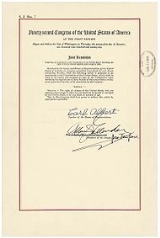
Twenty-sixth Amendment to the United States Constitution
Overview
United States Constitution
The Constitution of the United States is the supreme law of the United States of America. It is the framework for the organization of the United States government and for the relationship of the federal government with the states, citizens, and all people within the United States.The first three...
limited the minimum voting age to no more than 18. It was adopted in response to student activism
Student activism
Student activism is work done by students to effect political, environmental, economic, or social change. It has often focused on making changes in schools, such as increasing student influence over curriculum or improving educational funding...
against the Vietnam War
Vietnam War
The Vietnam War was a Cold War-era military conflict that occurred in Vietnam, Laos, and Cambodia from 1 November 1955 to the fall of Saigon on 30 April 1975. This war followed the First Indochina War and was fought between North Vietnam, supported by its communist allies, and the government of...
and to partially overrule the Supreme Court's
Supreme Court of the United States
The Supreme Court of the United States is the highest court in the United States. It has ultimate appellate jurisdiction over all state and federal courts, and original jurisdiction over a small range of cases...
decision in Oregon v. Mitchell
Oregon v. Mitchell
Oregon v. Mitchell, 400 U.S. 112 , was a case in the USA in which the Supreme Court of the United States held that states could set their own age limits for state elections....
. It was adopted on July 1, 1971.
In his 1954 State of the Union address
State of the Union Address
The State of the Union is an annual address presented by the President of the United States to the United States Congress. The address not only reports on the condition of the nation but also allows the president to outline his legislative agenda and his national priorities.The practice arises...
, President Dwight D. Eisenhower became the first president to publicly state his support for prohibiting age-based denials of suffrage
Suffrage
Suffrage, political franchise, or simply the franchise, distinct from mere voting rights, is the civil right to vote gained through the democratic process...
for those 18 and older.
On June 22, 1970, President Richard Nixon signed a law (not a constitutional amendment) which required the voting age to be 18 in all federal, state and local elections.
Unanswered Questions

